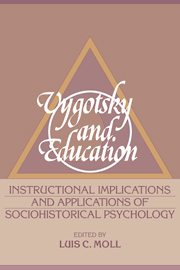Summary
In 1977 I spent a few months at the Laboratory of Comparative Human Cognition, now at the University of California, San Diego, then at Rockefeller University in New York City. The Lab was directed then, as it is now, by Michael Cole. I went as a predoctoral student to learn about the Lab's work and to finish my dissertation. As a graduate student at UCLA I had become very interested in the cross-cultural cognitive research (with the Kpelle in Liberia) conducted by Cole and colleagues (see Cole, Gay, Glick, & Sharp, 1971; Gay & Cole, 1969; Glick, 1974) and was eager to explore the relevance of that work to issues of minority education in this country. In particular, I was captivated by their studies of the relationship between culturally organized activities and thinking and by their clever methodological moves, combining ethnographic-like observations with manipulations of experimental tasks. Their findings, highlighting how cognition is embedded within the social and cultural world, indicated the paramount importance of contextual factors to thinking, a point neglected then in education and, I believe, still neglected today.
What I did not realize then was that this work would also serve as my introduction to Vygotsky's ideas – quite appropriately, a mediated introduction, as it turned out. I later learned that Cole had studied with Luria prior to the Kpelle research and that the work in Liberia was, to an extent, inspired by Luria's (and Vygotsky's) famous research in Central Asia (Luria, 1976).
- Type
- Chapter
- Information
- Vygotsky and EducationInstructional Implications and Applications of Sociohistorical Psychology, pp. ix - xPublisher: Cambridge University PressPrint publication year: 1990



